- Home
- Jude Deveraux
True Love Page 3
True Love Read online
Page 3
It dawned on Izzy what was in her friend’s mind. “And you’re staying in Kingsley House.”
“For a year.”
“Do you think he’s the Mr. Kingsley who lives there with you?” Izzy’s eyes were so wide they were circles. “That he’s the man who’s supposed to help you if you have any problems with the house?”
“No. I mean, I don’t think so. I couldn’t imagine such a thing.”
“But you hope so!” Izzy put her fingers to her temples. “I foresee plumbing disasters by the dozen. You’ll forget and turn on the water and douse him. He’ll have to remove his clothing and you’ll be wet too, then you’ll look at each other and tear your clothes off and—”
Alix was laughing. “I won’t be that blatant but I could see … maybe dropping a packet of my latest designs that just happen to land faceup and right at his feet.”
“That’s good,” Izzy said. “The fabulous sex can come later. First let him see what you can do in the way of architecture, then you sit back and let him take over and be the man. That’s a good plan.”
Alix was dreamy-eyed. “He’ll tell me that he’s never seen such innovative and well-thought-out designs in his life. He’ll say that I have a talent like he’s never seen before and he wants me with him every moment so he can teach me everything he knows. An entire year with my own private tutor. A year of learning and—”
“That’s it!” Izzy said.
“What is?”
“This whole will thing,” Izzy said. “Your mother said that this old woman who you never even met—”
“Mom says she and I spent a summer with her when I was four. And I guess they stayed in touch.”
“Okay, she’s a woman you don’t remember meeting, but she left you her house for a year. Victoria said it was because you wanted the break before you got a job. I’ve always thought the whole thing was fishy, because the old woman—”
“Miss Kingsley.”
“Right. Miss Kingsley didn’t know when she was going to die. For all she knew she could have lived to be a hundred and you’d be running your own company by then.”
“Maybe,” Alix said, “but only if I pass my tests.” It was an inside joke among architecture students that they spent longer in school than doctors, and at the end was a series of agonizing tests. But when they got out there were no jobs. “I don’t get your point.”
“I think Miss Kingsley, and probably your mother too, wanted you to meet the unmarried architect nephew, Jared Montgomery. Or in this case, Kingsley.”
“But if she’d lived to be a hundred, by that time he could have half a dozen kids.”
“Why let facts ruin a good story?”
“You’re right,” Alix said. “Miss Kingsley wanted me to meet her nephew, so she—with my mother’s encouragement—put me in the house next to him. Of course he lives and works in New York and is probably only here two or three weeks a year, but what does that matter to a whopping good story?”
“Are you saying you don’t think your mother had an ulterior motive for getting you into this old house?”
Alix knew her mother far too well to say no to that. The truth was that Alix didn’t care why or how this had been arranged. All that mattered was that she was being given this unbelievable opportunity. And was it actually possible that Jared Montgomery would be living right next door to her? In a guesthouse on the same property? “I will pick his brain clean,” she said. “I’m going to learn everything he knows, from design down to the drains. Remind me to send my mother roses. Come on, let’s go to the house.”
“No more ice cream?” Izzy asked.
“Are you kidding? Let’s walk fast and work up a sweat. Why did you let me eat all that chocolate?”
“Of all the ungrateful—” Izzy began but Alix’s laugh cut her off. “Very funny. Pardon me for not laughing. We have three days before he returns so we have a lot of work to do.”
“And I hear the shopping on Nantucket is good,” Alix said.
“Oh, no you don’t,” Izzy said. “I’ll do the shopping. You need to work. This is going to be the presentation of your life.”
“I do have a few ideas in my head,” Alix said, and Izzy laughed, as Alix always had an abundance of design ideas.
As they started walking, the first thing they noticed, now that the specter of what-Eric-did-to-Alix was no longer hanging over them, was the incredibly beautiful view of downtown Nantucket. The street was cobblestones, difficult to walk or drive on, but so very beautiful. The sidewalk was wide and laid with bricks. Over the centuries the trees and the settling of the earth had made them undulate and flow in an artistic way.
But what stood out the most for Alix were the buildings. One after another, each was exquisite. Perfect in design and execution.
“I think I’m going to faint,” Alix said as she stood in one spot and stared down the street at the town’s beauty.
“Yeah, it’s even better than the pictures I saw.”
“It’s … I don’t know, but I think it’s heaven. And …”
Izzy was looking at her friend in curiosity. They’d met each other on the first day of architecture school and they’d both been trim, pretty young women, but there the similarities stopped. Izzy’s ambition was to live in a small town and have an office where she did remodeling work. Her primary goal in life was a husband and children.
But Alix had inherited from her father a deep love of building. Her paternal grandfather had been a contractor and his son had spent his summers building houses. In the winter her father had worked in a shop and made cabinets. He’d earned his degree in architecture before Alix was born, and later it had been natural to him to begin teaching at the university level.
Her parents had divorced when Alix was a child and, as a result, she had grown up in two worlds. One was with her father, which involved everything about building, from her father’s design to hammering in the studs to choosing paint colors for the interior. And he loved teaching his daughter what he knew. She could read blueprints by the time she was in first grade.
The other half of her life revolved around her mother’s writing. Part of the year Alix and her mother lived quietly, just the two of them, while Victoria wrote novels that the whole world enjoyed. Every August her mother went away to a cabin in Colorado to isolate herself so she could plot that year’s novel. Her wildly popular books took a seafaring family down through the ages. When each book was finished, there were cocktail parties, extravagant dinners, and vacations. Alix’s life with her mother was a wonderful mix of quiet work and great excitement.
Alix had loved it all! She liked sitting on the tailgate of a pickup with her father’s crew and eating sandwiches, and she liked wearing a designer dress and laughing with the top publishing people in the world.
“They’re all the same,” Alix always said. “They all work for a living. Whether their tools are claw hammers or six-syllable words, they’re all workers.”
Between her two very successful parents, Alix had come out talented and ambitious. She had her father’s love of building and her mother’s belief that the top was the only place to be.
Izzy looked at Alix, her friend’s eyes glazed as she studied Nantucket, and Izzy almost felt sorry for Jared Montgomery. When Alix wanted to know something, she was insatiable.
“I’ve seen this before,” Alix said.
“Maybe you remember the place from when you were four.”
“Not likely, but …” Alix was looking around her. Across the road was a beautiful white wooden building with dark green window-frames across its front. On one side was painted a map that showed the distance from Nantucket to other parts of the world. Hong Kong was 10,453 miles away.
“ ‘We are the center of everything,’ ” Alix quoted. “That’s what I hear someone saying when I look at that map. ‘Nantucket is the epicenter of the earth.’ I must have heard that when I was four. I had never heard that word before, but in a funny way, I knew what it meant. Does that make se
nse?”
“Actually, it does,” Izzy said, smiling. It looked like she was going to be able to leave soon. She could tell by Alix’s tone that her friend remembered more about Nantucket than she thought she did. And even better, she was beginning to feel like Nantucket was home. If Victoria and the late Miss Kingsley had planned all this so Alix could meet the famous Jared Montgomery, it seemed to be working.
“Let’s go in here,” Izzy said. “We need to celebrate.” It was Murray’s Beverage store and inside were rows of wine, beer, and liquor. Izzy felt that they needed something cold and fizzy so she headed to the refrigerator against the back wall.
But Alix went to the old-fashioned wooden counter and looked at the shelves behind it. “I want rum,” she said to the woman behind the counter.
“Rum?” Izzy asked. “I didn’t know you liked that.”
“Me neither. I think I’ve had one rum and Coke in my life. But here on Nantucket I want rum.”
“It is a local tradition,” the woman said. “Which one do you want?”
“That one.” Alix pointed to a bottle of seven-year-old Flor de Caña.
“No rotgut for you,” Izzy said as she put a bottle of champagne on the counter.
Alix pulled her cell out of her bag and checked past emails. Her mother had given her directions to Kingsley House but in her upset over Eric, Alix hadn’t printed out a map. But then her mother’s directions were rather cryptic—which wasn’t uncommon. Her mother thought and wrote like a novelist, and she liked mystery.
Alix looked at the woman behind the counter. “I’m staying at a house here on Nantucket and my mother said it’s walking distance from the ferry. It’s number twenty-three Kingsley Lane and she said”—Alix checked her phone—“the lane turns beside West Brick. I don’t know what that means. How do I find West Brick Road?”
The woman, very used to tourists, smiled. “I bet it says the West Brick.”
“It does, actually,” Alix said. “I thought it was a typo.”
“You must mean Addy’s house,” the woman said.
“Yes. Did you know her?”
“Everyone did, and we all miss her a lot. So you’re the one who’s going to live there for a year?”
Alix was a bit shocked that the woman knew that. “Yes,” she said hesitantly.
“Good for you! And don’t let Jared bully you. He may be my cousin but I can still tell you to stand up to him.”
Alix could only blink at her. To her mind, Jared Montgomery slash Kingsley was a person to be revered, a god in the world of architecture where Alix lived and worked. But no one on Nantucket seemed in awe of him.
Izzy stepped forward. “We already met a man who says he’s … uh, Mr. Kingsley’s cousin. Are there many more?”
The woman smiled again. “A lot of us are descended from the men and women who first settled on this island, and we’re related one way or another.” She went to the register and rang up their purchases. “At the bank, go left. That’s Main Street. Up the road on the right are three brick houses that are just alike. Kingsley Lane turns to the right beside the last of the three brick houses.”
“The West Brick,” Alix said.
“You got it.”
They paid, said thanks, and left the store.
“Now all we have to do is find the bank,” Izzy said.
But Alix had gone back into her trance of looking at the town. Across the road was a building that stopped Alix in her tracks. A two-story center flanked by one-story additions with low, slanted roofs. A half-moon window above, a louvered octagon above that.
“I hate to interrupt your moment here but at this rate it’s going to be night before we get there.”
Reluctantly, Alix began to walk again, still studying each building they passed and admiring its perfection. When they came to what looked to be a movie set for a nineteenth-century drugstore Alix got excited. “I remember this place! I know it.” She opened the old-fashioned screen door and rushed inside, Izzy right behind her. To their left was a well-used counter, complete with stools in front and a mirror behind.
Alix put down her packages and sat on a stool. “I want a grilled cheese sandwich and a vanilla frap,” she said decisively to the young woman behind the counter.
Izzy took the stool next to her. “How can you be hungry, and what’s a frap?”
“Milk, ice cream.” Alix shrugged. “I don’t know. It’s what I always ordered and I need it now.”
“Ordered when you were four?” Izzy asked, smiling, pleased that her friend was remembering things.
A “frap” turned out to be an Americanized term for frappé—a milk shake. Izzy ordered the same and got tuna sandwiches to go.
“She bought things here,” Alix said as she ate her sandwich, which was served on a thin paper plate. “In the back.”
Izzy couldn’t resist a look around the store. At first glance it seemed to be a rather simple place, but a closer examination showed that the merchandise was very high-end. The skin products were the kind you found on Madison Avenue in New York.
“I bet your mother loved this store,” Izzy said when they were back outside on the sidewalk.
Alix looked at her friend. “What an interesting thought. If my mother did arrange all this about the will, when did she do it? She told me we spent a summer here when I was four. That’s when she and Dad split up, but she’s never mentioned Nantucket since then. When was she here? How did she know this Miss Adelaide Kingsley?”
“What I want to know,” Izzy said, “is who is ‘she’?”
“What are you talking about?”
“In the drugstore you said, ‘She bought things here.’ Did you mean your mother?”
“I guess so,” Alix said. “But I don’t think so. Right now it’s like I’m sinking down into another time. I have no conscious memories of this island but with every step I take I see something familiar. That store …” She was looking at Murray’s Toggery with its gray and white painted wood and the full glass front. “I know that children’s wear is upstairs and she … someone, that is, bought me a pink cardigan there.”
“If it was your mother, surely you’d remember her. Victoria is rather distinctive.”
Alix laughed. “Are you referring to her red hair and green eyes and a figure that causes car wrecks? I’m glad I look more like my father. Where do you think the bank is?”
Izzy was smiling at her friend. To hear Alix tell it, a person would think she was a plain little sparrow when compared to her mother, but far from it. While Alix didn’t stand out in a crowd as her mother did, she was extraordinarily pretty. She was taller than her mother and slender, with reddish blond hair that was naturally streaked. She wore it long with wispy bangs swept to one side and fat curls at the end. Whereas Izzy had to work to get curls in her dark hair, Alix’s were natural. She had blue-green eyes and a small mouth with full lips. “Like a doll’s,” Victoria had said at lunch one time, and her daughter had turned red at the compliment.
Alix’s modesty about her looks, her background, and even her talent was something Izzy had always admired about her friend.
Alix drew her breath in and came to a halt. “Look at that.” She was pointing to a tall, majestic-looking building at the end of the street. It was on a raised foundation, with a steep curved staircase leading up to the front door, which was set under a curved roof portico. The elegant building seemed to look over the town, a grand empress watching her subjects.
“A knockout,” Izzy said, but she was more interested in finding Kingsley House.
“No. Look at the top.”
Raised letters said THE PACIFIC NATIONAL BANK.
Izzy had to laugh. “Doesn’t look like my bank. What about you?”
“Nothing here looks like anything anywhere else,” Alix said. “If that’s the bank, we need to take that road on the left.”
They crossed the cobblestones on the brick walkway and headed up Main, past Fair Street. It was a road of houses, and each place was a
historian’s dream nestled under graciously weathered old shingles. There were very few of the usual gaudy Victorians that so many small American towns treasured as historic homes. Nantucket had been formed by Quakers, people who believed in plainness in their clothes, their attitudes, and especially in their houses. As a result, the homes weren’t covered in unnecessary ornament. To Alix’s trained eye, every roof, door, and window was a work of art.
“Think you can stand looking at this town for a whole year?” Izzy asked, laughing at Alix’s expression.
When they reached the three brick houses Alix looked like she might go into an old-fashioned swoon. Big, tall, impeccably maintained, the three houses were indeed impressive.
Alix seemed to be glued to the sidewalk as she looked up at the buildings, but Izzy moved past her.
Next to the last house a narrow lane opened up, the entry to it almost hidden by trees. A little white sign said KINGSLEY LANE.
“Come on,” Izzy called and Alix followed.
There was a narrow sidewalk on the right and silently the two of them started down it, looking at the house numbers.
“They’re named,” Izzy said in surprise. “The houses have names on them.”
“Quarterboards,” Alix said.
“Is that a word you just made up?”
“No. It’s—I don’t know how I know the word but that’s what those wooden plaques are called.”
“FIELD OF ROSES,” Izzy said, looking at a house set close to the road.
“BEYOND TIME,” Alix read on another house on the right. There was a driveway beside it but a gate blocked their view into the garden behind. In fact, there was a parking place beside each house they passed. Some were so narrow the cars nearly scraped the sides, but it did get the vehicles off the street.
“Look, that’s a B&B. SEA HAVEN INN.”
“And that …” Izzy said, looking across the road, “is number twenty-three. It’s called TO SEA FOREVER.”
Before them was a large, stunningly beautiful white house. Since the simplicity of it gave it a timeless feeling, the house could be new or hundreds of years old. There were five windows above, four below, each flanked by dark shutters, with a wide white door in the center. The roof was topped with a railed walkway.

 Eternity
Eternity The Temptress
The Temptress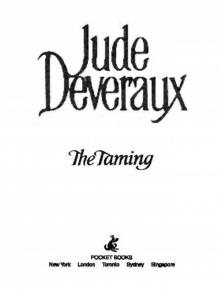 The Taming
The Taming True Love
True Love Forever...
Forever... Lavender Morning
Lavender Morning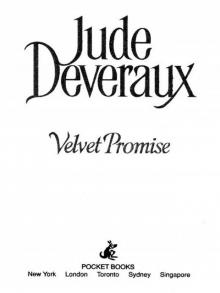 The Velvet Promise
The Velvet Promise Days of Gold
Days of Gold Temptation
Temptation Counterfeit Lady
Counterfeit Lady Twin of Fire
Twin of Fire Remembrance
Remembrance Velvet Angel
Velvet Angel The Enchanted Land
The Enchanted Land Just Curious
Just Curious Wild Orchids
Wild Orchids First Impressions
First Impressions Wishes
Wishes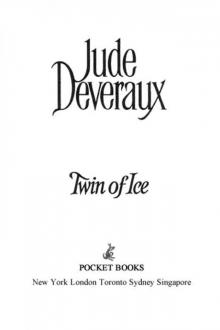 Twin of Ice
Twin of Ice Ever After
Ever After An Angel for Emily
An Angel for Emily River Lady
River Lady The Invitation
The Invitation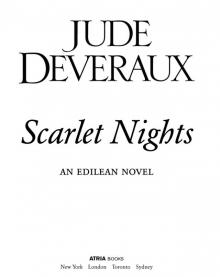 Scarlet Nights
Scarlet Nights The Black Lyon
The Black Lyon High Tide
High Tide The Girl From Summer Hill
The Girl From Summer Hill Sweetbriar
Sweetbriar As You Wish
As You Wish For All Time
For All Time Secrets
Secrets The Blessing
The Blessing Upon a Midnight Clear
Upon a Midnight Clear The Mulberry Tree
The Mulberry Tree The Scent of Jasmine
The Scent of Jasmine Sweet Liar
Sweet Liar Carolina Isle
Carolina Isle Holly
Holly A Knight in Shining Armor
A Knight in Shining Armor Always
Always The Duchess
The Duchess Forever and Always
Forever and Always The Raider
The Raider The Conquest
The Conquest Moonlight in the Morning
Moonlight in the Morning The Heiress
The Heiress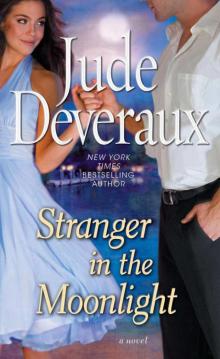 Stranger in the Moonlight
Stranger in the Moonlight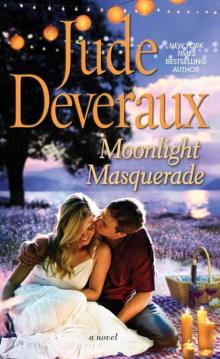 Moonlight Masquerade
Moonlight Masquerade Change of Heart
Change of Heart The Awakening
The Awakening Velvet Song
Velvet Song Someone to Love
Someone to Love The Summerhouse
The Summerhouse The Princess
The Princess Highland Velvet
Highland Velvet A Forgotten Murder
A Forgotten Murder Lost Lady
Lost Lady Met Her Match
Met Her Match LEGEND
LEGEND Forever: A Novel of Good and Evil, Love and Hope
Forever: A Novel of Good and Evil, Love and Hope Scarlet Nights: An Edilean Novel
Scarlet Nights: An Edilean Novel